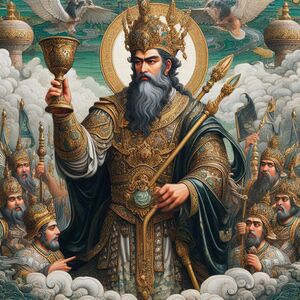User:Corumm
Corumm
BureaucratInterface administratorPush subscription manager⧼group-smwadministrator-member⧽Administrator⧼group-upwizcampeditors-member⧽- 6128 edits
owner and operator of Daxia LLC

- 1-army of common men- armed wing of CPC-wip Army of Common Men
- 2-Big Twinkie - conglomerate that produces ixnay's twinkie-requires expanded lore Big Twinkie
- 4-pacification/compliance via opium distribution xisheng/varshan- requires further input Xisheng Office of Contentment un mundo feliz por aldous huxley Linge Chen's Private Reserve
- 5-Harmonious Flotilla Invincible/Unconditional Divisions-wip Harmonious Flotilla Invincible
- 7- plateau of leng-done? create a kingom of leng historical entity Plateau of Leng
- 8- defense companies paramilitary orgs-pending
- 9- the Shining Path, a PCD ideology/manual for power consolidation-pending
- 10- Palace of the Purple Emperor-pending possibly replace with Daskara Palace
- 11- Cheese reserve-requires more input Mirzak Cheese Vaults
- 14- Abominable AI's made to "win using the coldest logic and computational power-pending
- 15- Chen's menagerie- needs more animals Chen's Menagerie
- 21- Plascrete/hypersteel-pending
- 25- Corummese Car and Automata Manufactory-COCAM-needs more lore Standard People's Compact Vehicle
- 27- corummese MULTIPASS-pending
- 28- mirzak monorail run by artificial intelligence aka roborail-Mirzak Automated Monorail System incomplete
- 30- corummese nuclear program- link with Lixin Ji
- 31- Democratic Christian Church of Corumm and the East-incomplete
- 33- corummese captagon to undermine rivals-Drug trade in Corumm-done ish Opodo Corporation
- 39- Virtuous Worms - Virtuous Worms wip
- 43- South Seas Development Company - A colonial conglomerate developing industries in Zhijun and colonial Stenza, possibly Rusana too under a subsidiary. wip 30%
- 44- add green crab and asian carp to fauna/food
- 45- corumm-rusana-canpei economic corridor
- 49- rich people donate dna to create sacks of flesh with organs to replace their aging organs and live longer
- 51- imperial trinket/Amiable Ecumene/Zone of Absolute Fortune
- 53-dry counties

- 54-Daxian monarchs giving patents of authority to vassals- tie into Tributary system of Imperial Daxia
- 55-some sort of grandiose defensive line
- 56-GW2 Daxian mini front in Caldera in support of Faneria
- 57-daxian colonization of peratra/australis article
- 58-palace school for dwarfs to become generals and shit
- 59-early daxian computers based on the zhivkov balgarsko model
- 60-substitute kingship ritual/occultation of the emperor
- 61-the scream box
- 62-apricot suzerainty
- 63-hyrax
- 64-supreme dreamer
- 65-Anathematic Arc
- 66-my own CHENGGUAN

I was a beast upon the earth, a salamander or an eel. Water passed through that earth as streams pass through a garden. Beside each stream grew sweet grass. Not much of it, but enough to feed little aphids, who lived mean and starving lives.
Now there came an upwelling of water from the earth, so that the streams ran fat and slow. The grass grew thick. The aphids mated and multiplied. Ants came to enslave the aphids, and the aphids joined together to oppose them. And in victory they returned to tend their grass, to aerate its roots and spread its seeds. So they did thrive.
Now it occurred to me that I might join two streams by crawling between them on my belly. Having done so, I saw that I might dam one stream to divert its water into the other. The aphids of the first stream came to me in protest, but I said to them, "Go to the new pond I have made, and join the aphids there in cultivation, and I will send more water unto you."
And they were greatened by the joining.
Thus, I proceeded to join all the streams together into one pond. And whenever the aphids of a small stream might protest, I said to them, "Go, look at my pond, and see the plenitude I have provided to my people there." When it became necessary to stop those upstream from polluting the water, I offered them the bounty of our pond, the grass and the watercress. And if they did not yield, I sent the ant-fighters against them, because their petty good injured the good of the all.
I appointed ministers of water and soil and seed and war, and to the most loyal, I gave these posts as reward; but ultimately their power depended on me, for they were aphid and I was Leviathan.
In time, I became the coordinator of all water and the dispensator of fertility. Then I became the coordinator of coordinators, and I gave up the control of thirst and life for control of those who had control. And all my craft became the pure and abstract management of power.
Then saw upon the horizon a wave, and the wave was God, and it approached me, saying, "We are as one, you and I. We are the gathering of the waters. Gather unto me as they have gathered unto you; we will be as one." The aphids screamed and begged me for salvation. But I was not of them. I was of the wave.
- To them, there are no states, only zones and territories, Peeter explains. Russia sees itself as being surrounded by vassals and ancillaries – there is no third option. They’ll never come to terms with the breakup of the USSR,“ Mežviets says. As Russia’s leaders themselves have declared: Russia ends where it is stopped. It’s a conqueror’s mindset, Everyone around them are enemies.
| Province | Capital | Population |
|---|---|---|
| Central | Mirzak | |
| Yang | Daguo | |
| Zong | Zong | |
| Liyuan | Menshen | |
| Ganshi | Shuiguo | |
| Henyin | Akkan | |
| Chesad | Mimban | |
| Hongse | ||
| Leng | Korell | |
| Uxos | Maozi | |
| Mung | Minxia City | |
| Liao | Datlof | |
| Mulm | Urum | |
| Sanyu | Niao | |
| Pingu | Zhongzi | |
| Chenn | Pianqu | |
| Xisheng | Pinghai | |
| Cao | Zhenzhu | |
| Zhijun | Yishi |